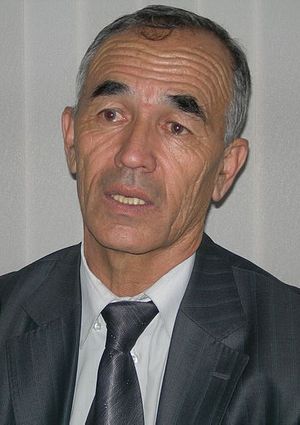This week the United States riled the Kyrgyz government by awarding Azimjon Askarov the U.S. State Department’s Human Rights Defender Award. Askarov is an ethnic Uzbek Kyrgyz currently serving a life sentence after being arrested and convicted in 2010 of inciting ethnic hatred during the post-revolution violence that erupted in southern Kyrgyzstan. The award is given to individuals and non-governmental organizations to honor their “exceptional valor and leadership in advocating for the protection of human rights and democracy.”
In 2002, Askarov founded Vozduh, a group aimed at monitoring the conditions of Kyrgyz prisons, which are routinely criticized for torture. When the violence broke out in 2010, Askarov photographed and filmed some it in his hometown. The Kyrgyz state says he participated in organizing the violence, Askarov maintains his innocence. Most of those killed during the June 2010 violence were ethnic Uzbeks, as were most of those convicted of crimes relating to the violence. The five year anniversary passed last month and though violence has not returned, tensions remain and rumors abound.
The Kyrgyz foreign ministry complained officially about the award this week, saying it may do “serious damage to bilateral relations.” The ministry lays out Askarov’s crimes–“incitement of interethnic hatred, organizing mass riots, complicity in murder of a law enforcement officer”–and unambiguously accuses the U.S. of undermining Kyrgyzstan’s stability. The Kyrgyz point to the timing of the award–four years after Askarov’s conviction–as surprising:
Even more surprising is that such an award was never given to any human rights activist of the Kyrgyz Republic during the rule of former presidents A.Akaev and K.Bakiyev. In such context, this award will be associated with the withdrawal of the Transit Center from the International airport “Manas” in Bishkek and the appointment of Richard Miles as interim head of the American mission.
A degree of paranoia relating to foreign influence is implied by the ministry’s tone, its mention of the former presidents (both unseated by revolution) and the now-closed Manas transit center, which the U.S. opened in 2001 to support the war in Afghanistan and closed in 2014 when the lease ran out and the combat mission was ending. The paranoia evident in the Kyrgyz complaint is consistent with other developments in the country–namely the draft ‘foreign agents’ law.
Conspiracy theories arguing that the U.S. is attempting to engineer a “color revolution” in Kyrgyzstan are particularly virulent. These theories play into modern history and current events–memories of the revolutions, the country’s troubled economy and Russia’s resurgent presence in the region. The early 2015 appointment of Richard Miles as charge d’affaires at the U.S. embassy in Bishkek pushed the conspiracy mills into overdrive–he had been ambassador to Georgia during the 2003 Rose Revolution.
Over the years several human rights organizations have called for Askarov’s release, saying he is a prisoner of conscience. Human Rights Watch routinely includes Askarov on lists of prisoners leaders in the U.S. and Europe should pressure the Kyrgyz state to release–saying his trial was unfair and politically motivated. The Committee to Project Journalists has repeatedly called for his case to be reopened–saying that he was targeted for “his role in documenting failures by police to stop human rights abuses.”
Not all those interested in freeing Askarov are Westerners. In March 2015, the homes and offices of two Kyrgyz lawyers working with Bir Duino, a Kyrgyz human rights group, on Askarov’s case were searched by Osh police. In June, the Kyrgyz Supreme Court ruled the searches illegal–but that is little solace to the lawyers who say authorities seized materials relating to over 100 cases.
The Kyrgyz call Askarov a “criminal who publicly incited ethnic hatred” while the U.S. says he “is a uniting figure in the human rights community, bringing together people of all ethnicities and backgrounds to urge the government of Kyrgyzstan to take effective action towards creating a sustainable peace between Uzbeks and Kyrgyz.”
The region’s dreadful human rights record is well-known, but what the U.S. should do about it is decidedly less clear. Human rights activists–tired of patience–say the U.S. can revise its strategy to move actively punish the lack of progress in human rights, by not waiving military aid restrictions, enacting sanctions, visa bans and asset freezes. The U.S. worries, however, that such measures may push the region toward Russia at an even faster pace. In the meantime, some parts of the U.S. government–such as the State Department bureau concerned with human rights–are doing what they can to signal Washington’s dissatisfaction.
































